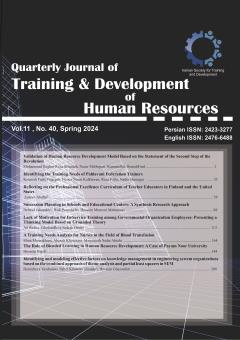Identifying the Training Needs of Pahlavani Federation Trainers
Subject Areas :Kurosh Fathi Vajargah 1 , Dr Firouz Nouri Kalkhoran 2 , reza fathi 3 , Nader Barzegar 4
1 - Professor, Faculty of Psychology and Educational Sciences, Shahid Beheshti University, Tehran, Iran
2 - Assistant Professor, Department of Educational Sciences, Faculty of Humanities, Bo Ali Sina University, Hamadan, Iran.
3 - Assistant Professor, Environment and Energy Department, Energy Research Institute, Materials and Energy Research Institute, Tehran, Iran
4 - Assistant Professor, Islamic Azad University, Islamshahr Branch, Tehran, Iran
Keywords: training needs, Pahlavani Federation, trainers, training and development,
Abstract :
The development of sports coaches of is an important issue and success in the field of sports could lead to significant cultural, educational and economic achievements. Since Pahlavani Federation is located in Iran and also the main trustee of the management of this field at the international level belongs to the country of Iran, the significance of studying the field increases. The development of coaches can lead to transformation and promotion in the field of sports. The training and development of coaches at all levels is important, and in terms of global reputation, this group has the most influence in gaining honor. Therefore, the purpose of this study was to identify the educational needs of sports coaches in fields related to Pahlavani Federation. To this aim, the study was conducted with a mixed approach. In the qualitative phase, using the exploratory method and with two DACUM tools (9 participants) and semi-structured interview (12 participants and selected with the Snowball approach) and the test analysis method with Atride and Stirling's model, the needs of Pahlavani Federation coaches were extracted, and then the educational needs were determined and prioritized by the survey method (using T-tag group tests, one-way variance analysis or ANOVA, as well as Friedman's test). Educational needs were classified and presented in the form of five main groups of moral abilities, international abilities, specialized abilities, soft abilities, and organizational alignment abilities after examination and analysis.
1. Ceyhan MA. Examination of Information and Communication Technologies Competencies of Teacher Candidates Studying at the Faculty of Sport Sciences. Education Quarterly Reviews. 2022 Mar 26;5(1).
2. Thornton JS, Grierson L, Vanstone M, Allice I, Mahmud M, Mountjoy M. A Win–Win for Sport and Exercise Medicine and Primary Care: A Qualitative Case Study of the Added Competence Model in Canada. Sports Medicine. 2022 Mar 16:1-7.
3. Loftus S, Taylor R, Grecic D, Harper DJ. Olympic and Paralympic coaches living with stress—is it such a problem? Potential implications for future coach education in sport. International Sport Coaching Journal. 2022 Jul 9;1(aop):1-3.
4. Kingsbury D. Coaches’ acquisition of sport science knowledge and the role of education providers (Doctoral dissertation, Sheffield Hallam University).
5. Subba, Rao (2009), “Essentials of Human Resource management and Industrial Relations” , Himalaya Publication House, 3rd Revised & Enlarged Edition.
6. Paradise A. (2007). State of the Industry: ASTD’s Annual Review of Trends in Workplace Learning and Performance. Alexandria, VA: ASTD
7. Shippmann, J.S., Ash, R.A., Battista, M., Carr, L., Eyde, L.D., Hesketh, B.J., Kehoe, J., Pearlman, K., Prien, E.P., & Sanchez, J.I. (2000). The practice of competency modeling. Personnel Psychology, 53, 703-740.
8. Kelessidis, Vassilis. (2000). BENCHMARKING. Report produced for the EC funded project. Available at:
9. Mueller, E. (2006). Production planning and operation in competence cell based networks, Production Planning & Control, 17 (2), 99–112.
10. Kuttim, M. Kallaste, m vensaar, U.and kiss. A. Entrepreneurship Educational University Level and students Entrepreneurial Intentions. Procedia-social and Behavioral science. 2014; 110: 658-668.
11. Braun, V., & Clark, V. Using thematic analysis in psychology. Qualitative in psychology.2006; 3(2): 77-101.
12. Attride – Stirling, J. Thematic networks: an analytic tool for qualitative research. Qualitative research,2001 ;1(3): 385-405.
13. Samadianbarzaki, Abbasali,safari,mahmoud,Oladian,Masome.(2024).Presenting a model in order to improve the professional qualification of human resources managers of National Bank of Iran Quarterly Journal of Training and Development of Human Resources,39,133-150.
14. Nouri Kalkhoran,Dr Firouz.(2023)Determining the factors of the decision making model for choosing training and learning methods in human resources development Quarterly Journal of Training and Development of Human Resources,37,PP.239-262.


